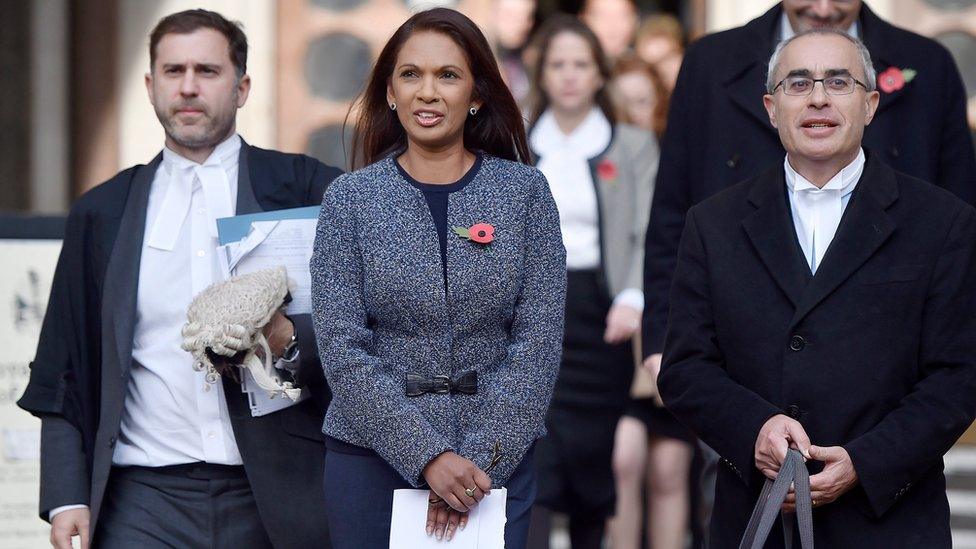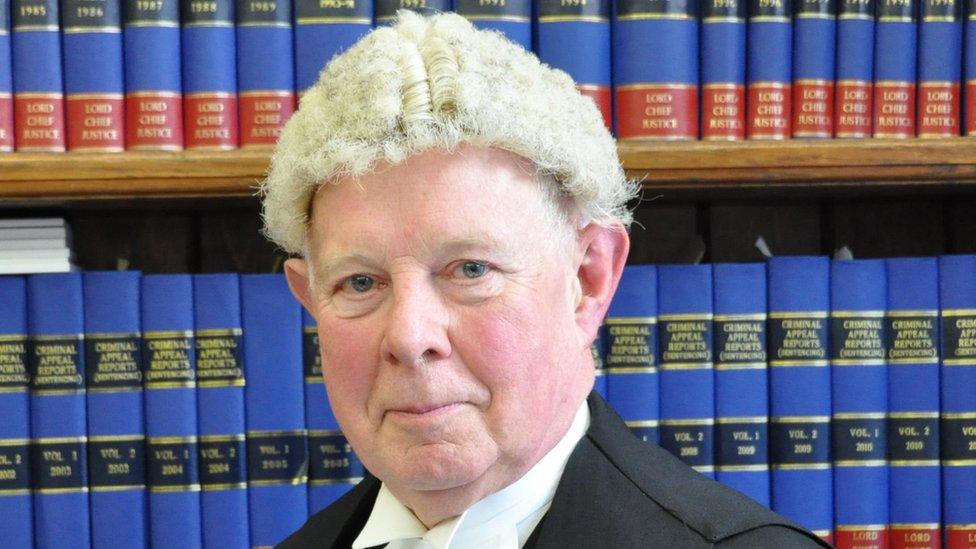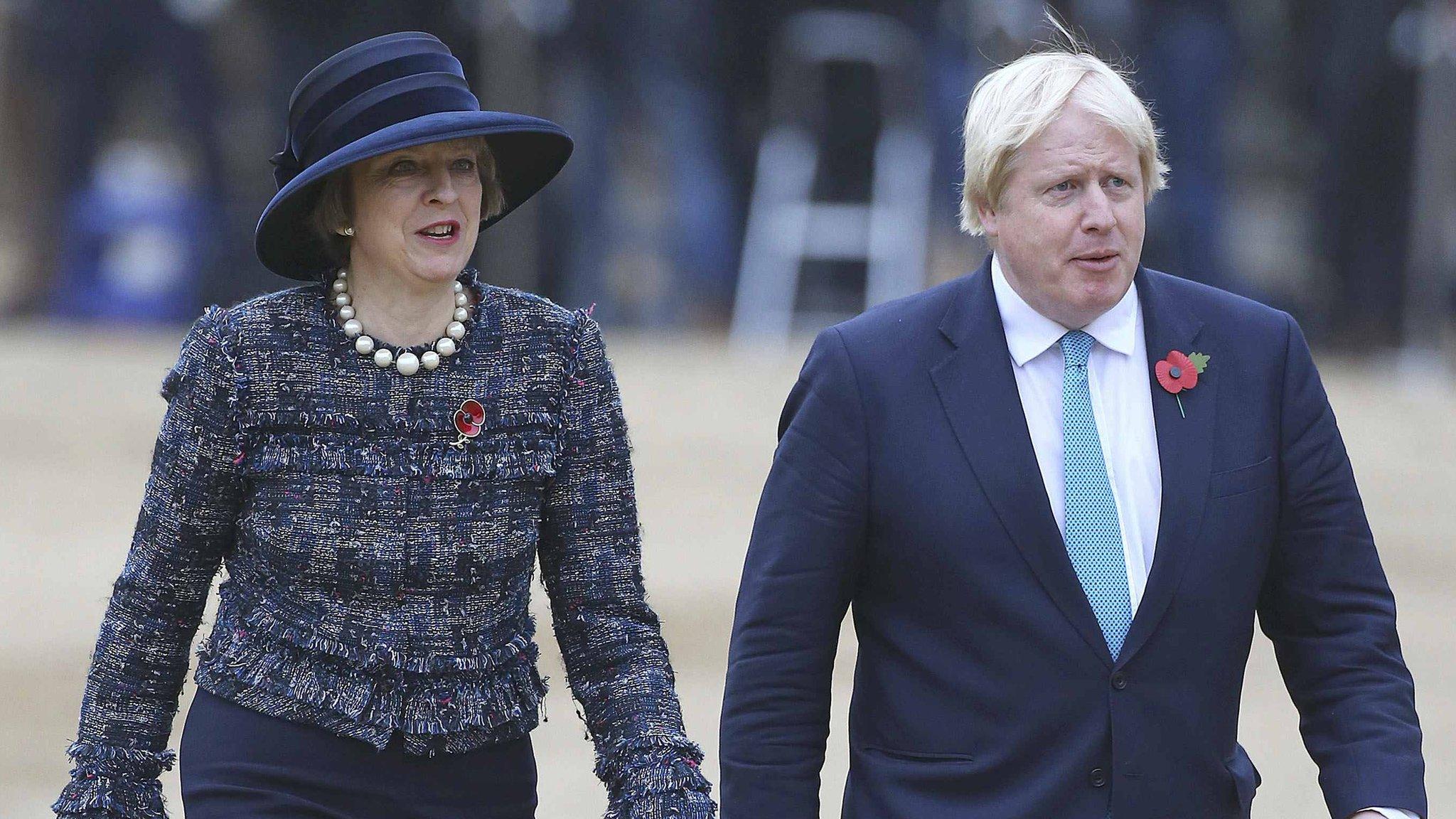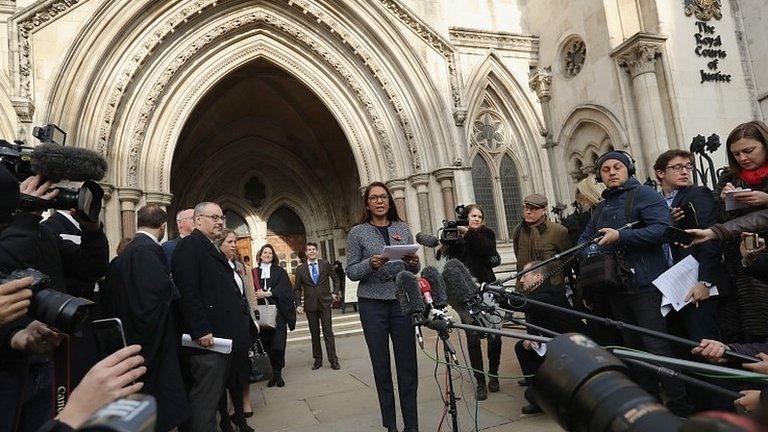The legal questions at the heart of the High Court Article 50 ruling
- Published
- comments

Lead claimant Gina Miller (centre) argued that some rights would be lost once Article 50 was triggered
The ramifications might be seismic, but the question at issue in this momentous legal dispute could not have been clearer.
The Lord Chief Justice Lord Thomas put it in this way: "The sole question in this case is whether, as a matter of the constitutional law of the United Kingdom, the Crown - acting through the executive government of the day - is entitled to use its prerogative powers to give notice under Article 50 for the United Kingdom to cease to be a member of the European Union."
He stressed that it was a "pure question of law" with "no bearing" on the merits of the UK withdrawing from the EU.
Many of today's papers took issue with that.
In beginning his judgment, Lord Thomas firmly asserts the critical importance in our law of the sovereignty of parliament: "The most fundamental rule of UK constitutional law is that the Crown in Parliament is sovereign and that legislation enacted by the Crown with the consent of both Houses of Parliament is supreme."
He quotes a predecessor, Lord Bingham, who said: "The bedrock of the British constitution is... the supremacy of the Crown in Parliament."
Kings and queens
He then turns to the Crown's prerogative powers.
These are a collection of executive powers derived from the Crown from medieval times.
Once exercised by all-powerful kings and queens, they have been dramatically reduced over centuries and the residue are now vested in the hands of ministers.
Exercising them is controversial because they have the effect of by-passing our "supreme" Parliament.
Lord Thomas says: "An important aspect of the fundamental principle of Parliamentary sovereignty is that primary legislation is not subject to displacement by the Crown through the exercise of its prerogative powers."
So, prerogative powers are strictly limited and in the relationship between them and Parliament it is Parliament that very firmly has the upper hand, because, "This subordination of the Crown [ie the executive government] to law is the foundation of the rule of law in the United Kingdom", he says.
In other words, Parliament is king - top dog of the constitution.
The government cannot use executive powers to override legislation. Only legislation can override legislation.
That, in essence, was the argument of Gina Miller, the investment manager who was the lead claimant in the case.

Lord Thomas agreed with the claimants that the Crown could not give notice under Article 50
So when can ministers use prerogative powers?
It is agreed and part of our law that they can be used in international relations and the making and unmaking of international treaties.
That is permissible because generally exercising these powers in this arena has no effect on domestic law, so there is no collision with parliamentary legislation, and parliamentary sovereignty is not affected.
The government argued that using prerogative powers to trigger Article 50 was a "classic exercise of the royal prerogative", and that if Parliament had not wanted it used it would have said so in the 2015 European Union Referendum Act.
Rights enjoyed
Where the government came a cropper is that it fully accepted that triggering Article 50 by using prerogative powers would have the effect of changing domestic law.
By enacting the 1972 European Communities Act (the 1972 Act), which took the UK into what was then the European Economic Community, now the EU, Parliament made EU law part of our law.
Rights enjoyed by you and me were written into our law via the 1972 Act.
However, the government argued that Parliament must have intended that ministers would keep the prerogative power to withdraw from EU treaties and so would continue to have the power to choose whether EU law - including the rights given to us under it - should continue to have effect in domestic law.
Gina Miller's lawyers argued that once Article 50 is triggered some rights, such as the right to vote in EU elections and to petition the European Court of Justice, would be extinguished forever.
They claimed that it was not enough for the government to assert that many rights would be restored later in the Great Repeal Bill.
The court categorically disagreed with the government.
Lord Thomas concluded that, "Parliament intended EU rights to have effect in domestic law and that this effect should not be capable of being undone or overridden by action taken by the Crown in exercise of its prerogative powers."
Slam dunk!
"The Crown cannot, through the exercise of its prerogative powers, alter the domestic law of the United Kingdom and modify rights acquired in domestic law under the ECA 1972 or the other legal effects of that Act.
"We agree with the claimants that, on this further basis, the Crown cannot give notice under Article 50(2)."
Slam, slam, dunk, dunk.
The judgment did not go on to say specifically that an act of Parliament is needed to give ministers the authority to trigger Article 50.
The judges were understandably keen to keep some constitutional distance and not be seen to be telling Parliament precisely how to exercise its sovereignty.
However, it is almost impossible to see how Parliament could give its authority to ministers to serve notice under Article 50 without full-blown primary legislation, ie an act of Parliament.
Massive political consequences
What is now an epic legal battle reveals arguably the great constitutional clash of our time.
A government used to getting its way has been stopped in its tracks by independent judges, unelected and who some regard as unaccountable, but who through the mechanism of judicial review can defy ministers, if what they are proposing is unlawful.
The judges may have been deciding a purely legal point, but it is a legal point with massive political consequences.
These tectonic plates of our constitution will grind up against each other again next month when the government appeals to the Supreme Court.
For the first time ever, all 11 permanent justices, including those from Northern Ireland and Scotland, are likely to sit - underlining the importance of what is at stake.
If the High Court's ruling is overturned, the government's problems in triggering Article 50 probably disappear.
If it is upheld and the government is forced to bring in an act of Parliament to give it the authority to trigger our withdrawal from the EU, the timing and manner of Brexit is thrown into confusion.
There is an intriguing further option.
The Supreme Court could in theory refer the question of the construction of Article 50 to the European Court of Justice, which is in effect the EU's Supreme Court.
But asking that court to adjudicate on the mechanism for the UK departing the EU, and by implication consider issues relating to the sovereignty of Parliament, would be so drenched in irony it would be almost unthinkable.
- Published4 November 2016

- Published4 November 2016

- Published3 November 2016
- Published25 September 2019
